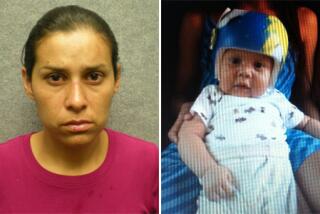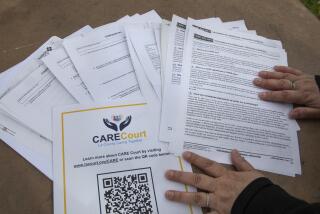Judge Won’t Confine Massip; Outpatient Therapy Is Ordered
- Share via
A Superior Court judge Friday ignored a recommendation that Sheryl Lynn Massip be confined to a state mental hospital and ordered her to undergo at least a year of outpatient therapy to determine whether she has recovered from a psychosis that led her to kill her infant son 2 years ago.
Judge Robert R. Fitzgerald appeared to have based his unexpected ruling on an 11th-hour disclosure that a Los Angeles County man in circumstances similar to Massip’s had been allowed to undergo outpatient therapy at a clinic in Fullerton, contrary to what was described as established procedure in Orange County.
Under those procedures, psychologists and an administrator for county mental health programs testified, authorities are required by law to confine and evaluate for at least 6 months anyone found guilty of certain violent crimes by reason of insanity.
The only facility designated as appropriate for such confinement--even if the person had shown significant progress toward recovery--is Patton State Hospital in San Bernardino County, the officials said.
The psychologists, during a lunch break in the court proceeding, however, checked and disclosed that they had found an exception to that rule, which involved a man who had been found not guilty of assault by reason of insanity.
The man, they said, had been undergoing outpatient therapy in Los Angeles County and then was transferred in 1980 to an outpatient clinic in Fullerton.
“If we can accept transfers from Los Angeles” into the outpatient program, “we can accept this woman,” Fitzgerald said as he made his ruling.
The judge had listened attentively during the daylong hearing in Santa Ana as county mental health workers, one after the other, agreed with Massip’s lawyer, Milton C. Grimes, that Massip is no longer mentally ill and is a perfect candidate for outpatient therapy.
Still, the judge’s decision stunned the 24-year-old La Palma woman, who said later that she had come to court prepared to be sent to a mental hospital. She based her expectation, she said, on the Feb. 23 recommendation from county psychologists.
Now that she suddenly finds herself free to go on with her life, Massip said, she intends to get a driver license and look for a job as a beautician.
“I will continue getting well. I’ll do what I can to better myself,” she said.
Asked if she planned to have more children, Massip responded, “Absolutely not. That’s a very futuristic question at this point.”
Fitzgerald’s ruling brought tears to the eyes of Massip’s mother and stepmother, who have stood staunchly beside her during nearly 2 years of court proceedings. Massip’s husband filed for divorce after their son’s death and testified against his wife during her trial.
Sheryl Massip’s case attracted national attention because of her contention that she was suffering from a rare, unusually severe case of postpartum depression--or “baby blues”--in April, 1987, when she ran over her 6-month-old son with the family car, then tried to cover up the killing.
A jury last year found her guilty of second-degree murder. But Fitzgerald, in an extraordinary action in December, set aside that verdict and ruled that Massip indeed had been insane at the time of the killing, and therefore was not responsible for her actions.
Deputy Dist. Atty. Thomas J. Borris, who prosecuted Massip, said after Fitzgerald’s ruling that the judge’s action on the jury verdict is in the process of being appealed. He added that he did not know if Friday’s ruling also will be appealed.
“Our office’s position is that the judge, by statute, had to send (Massip) to Patton,” Borris said.
Massip’s attorney, however, argued that sending her to Patton would serve no purpose because she had “progressed far beyond” the need for such restrictive treatment.
Grimes also told Fitzgerald that he feared his client would be harmed by other patients at the state hospital because she had killed a child.
The psychologists who testified Friday, including Massip’s personal therapist, said repeatedly that Massip, though still in need of psychological treatment, poses no threat to herself or others.
Massip is undergoing hormonal therapy as well as psychological therapy.
Grimes said no schedule has been set for her treatment at the Fullerton clinic, but he added that she would be going there for anywhere from 1 to 5 days each week, for sessions that could last up to 6 hours.
After a year of such treatment, Judge Fitzgerald said he will determine if further therapy is necessary. Such therapy could last as long as 11 years, Grimes said.
More to Read
Sign up for Essential California
The most important California stories and recommendations in your inbox every morning.
You may occasionally receive promotional content from the Los Angeles Times.













